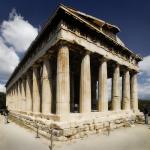|
This section contains 1,742 words (approx. 6 pages at 300 words per page) |

|
Mythological Origins.
According to mythology, the theater in ancient Greece sprang from rituals that both honored and appeased the god Dionysus. Dionysus first taught the precious skill of viticulture, the cultivation of grapes for winemaking, to a man named Icarius. Icarius wore goatskins in honor of the god, who had been disguised as a goat in childhood to protect him from the wrath of Hera, queen of the gods. After Icarius served his newly made wine to some shepherds, they became ill from overindulgence and, believing that Icarius had poisoned them, killed him. In order to atone for their crime, they, too, donned the skins of goats and danced and sang around the fire to honor Dionysus and his pupil. From these songs and dances grew rituals of public performance, or so myth would have it. Human beings are fascinated by storytelling and the...
|
This section contains 1,742 words (approx. 6 pages at 300 words per page) |

|




